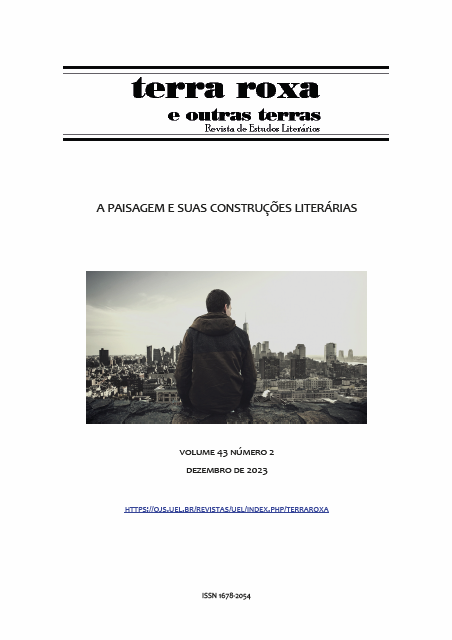Foreword
DOI:
https://doi.org/10.5433/1678-2054.2023vol43n2p6Keywords:
PaisagemAbstract
This dossier on "Landscape and its Literary Constructions" addresses the complex relationship between human action, environmental destruction, and reflection on the landscape. We highlight the apparent contradiction between the intensification of discourse on the landscape in contemporaneity and the simultaneous increase in environmental destruction. Geographer Augustin Berque proposes the concept of "landscape-thinking," emphasizing the visceral relationship between humans and the world expressed in landscapes.
The landscape is considered a record of human passage through the world, and its destruction would imply the loss of traces of ancestry and past experiences. However, "landscape-thinking" is seen as a relational form of interaction with the world, moving away from Cartesian dualism.
There is emphasis on the role of landscape representation in literature, from romantic archetypes to contemporary approaches that reflect environmental concerns. Landscape in literature is seen as an artistic expression that reveals the interconnection between humans and the environment. The seventeen studies address works by Portuguese and Brazilian authors, analyzing how the landscape relates to themes such as identity, migratory movement, subjectivity, and even political and environmental issues, revealing diverse values and meanings and promoting a consistent interpretation of the human condition.
Downloads
References
BERQUE, Augustin. O Pensamento-paisagem. Trad. de Vladimir Bartalani e Camila Gomes Sant'Anna. São Paulo: EDUSP, 2023.
BESSE, Jean-Marc. O gosto do mundo. Exercícios de paisagem. Trad. de Anne Cambe. Rio de Janeiro: EDUERJ, 2014.
COLLOT, Michel. Poética e filosofia da paisagem. Trad. de Ida Alves et al. Rio de Janeiro: Oficina Raquel, 2013.
Downloads
Published
How to Cite
Issue
Section
License
Copyright (c) 2023 Regina Célia dos Santos Alves, André Pinheiro

This work is licensed under a Creative Commons Attribution 4.0 International License.
Authors who publish in this journal agree to the following terms:
a) The authors retain the copyright and grant the journal the right of first publication, the work being simultaneously licensed under the Creative Commons Attribution-NonCommercial 4.0 International License, allowing the sharing of the work with acknowledgment of the authorship of the work and initial publication in this journal.
b) Authors are authorized to assume additional contracts separately, for non-exclusive distribution of the version of the work published in this journal (eg, publish in an institutional repository or as a book chapter), with acknowledgment of authorship and initial publication in this journal.
c) Authors are allowed and encouraged to publish and distribute their work online (e.g. in institutional repositories or on their personal page) after the editorial process, as this can generate productive changes as well as increase impact and citation of the published work (See The Effect of Open Access).
d) The authors of the approved works authorize the journal to, after publication, transfer their content for reproduction in content indexers, virtual libraries and the like.
e) The authors assume that the texts submitted for publication are of their original creation, taking full responsibility for their content in case of any objection by third parties.




















